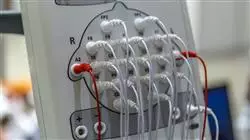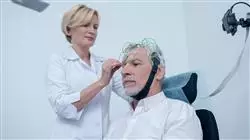University certificate
The world's largest faculty of nursing”
Introduction to the Program
This program is designed to provide you with the latest advances and developments in treatment and nursing care in one of the most common neurological diseases: Epilepsy"

This program delves into the management of one of the most common neurological diseases: epilepsy. About 50 million people suffer from this disease around the world. Therefore, it is necessary to establish the classification, symptomatology and possible causes of epilepsy, as well as the classification of epileptic seizures. It is a disease that, if not controlled, causes a great loss of autonomy.
On the other hand, in recent years new antiepileptic drugs have appeared that have the same ability to control seizures, but with fewer side effects. These treatments will be described in the Postgraduate certificate, as well as other different surgical procedures in drug resistant patients, which greatly reduce the percentage of crises. For this we will see how the use of EEG video diagnosis influences, which in some cases makes it possible to locate the epileptogenic focus and suppress it with surgery, reducing seizures by 80%.
Finally, specific nursing care in Epilepsy is defined, in such a way that this knowledge is integrated to be able to perform a specific assessment by functional patterns and diagnose according to NANDA taxonomy, planning outcome criteria based on NOC taxonomy and nursing interventions in accordance with NIC taxonomy.
In addition, as it is a 100% online diploma, it provides the student with the ease of being able to take it comfortably, wherever and whenever they want. All you need is a device with internet access to take your career one step further. A modality according to the current times with all the guarantees to position the nurse in a highly demanded area.
You will learn the influence of the use of video EEG diagnosis, which in some cases allows locating the epileptogenic focus and suppressing it with surgery, reducing seizures by 80%"
This Postgraduate certificate in Epilepsy for Nursing contains the most complete and up to date curriculum on the market. The most important features of the program include:
- Development of more than 100 case studies presented by experts in neurological nursing
- Its graphic, schematic and eminently practical contents, which are designed to provide essential scientific and assistance information for professional practice
- Latest developments in neurological nursing
- Contains practical exercises
- Theoretical lessons, questions to the expert and clinical cases for individual reflection
- Availability of content from any fixed or portable device with internet connection
- Multimedia content developed with the latest educational technology, which will allow the professional a situated and contextual learning, i.e. a simulated environment that will provide an immersive learning programmed to train in real situations
What are the causes of Epilepsy and how is it treated? This Postgraduate certificate gives you the answers and the latest advances in the healthcare sector focused on this neurological disease"
The program’s teaching staff includes professionals from the sector who contribute their work experience to this training program, as well as renowned specialists from leading societies and prestigious universities.
The multimedia content, developed with the latest educational technology, will provide the professional with situated and contextual learning, i.e., a simulated environment that will provide immersive training programmed to train in real situations.
This program is designed around Problem Based Learning, whereby the professional must try to solve the different professional practice situations that arise during the academic year. For this purpose, the professional will be assisted by an innovative interactive video system created by renowned and experienced experts.
You will deepen in the pharmacological treatment of Epilepsy, knowing its indications according to the type of Epilepsy and acting with rigor and knowledge of the cause"

Specialize with this program and learn to differentiate syncope and non epileptic events of psychogenic origin in the differential diagnosis of epileptic seizures"
Why study at TECH?
TECH is the world’s largest online university. With an impressive catalog of more than 14,000 university programs available in 11 languages, it is positioned as a leader in employability, with a 99% job placement rate. In addition, it relies on an enormous faculty of more than 6,000 professors of the highest international renown.

Study at the world's largest online university and guarantee your professional success. The future starts at TECH”
The world’s best online university according to FORBES
The prestigious Forbes magazine, specialized in business and finance, has highlighted TECH as “the world's best online university” This is what they have recently stated in an article in their digital edition in which they echo the success story of this institution, “thanks to the academic offer it provides, the selection of its teaching staff, and an innovative learning method aimed at educating the professionals of the future”
A revolutionary study method, a cutting-edge faculty and a practical focus: the key to TECH's success.
The most complete study plans on the university scene
TECH offers the most complete study plans on the university scene, with syllabuses that cover fundamental concepts and, at the same time, the main scientific advances in their specific scientific areas. In addition, these programs are continuously being updated to guarantee students the academic vanguard and the most in-demand professional skills. In this way, the university's qualifications provide its graduates with a significant advantage to propel their careers to success.
TECH offers the most comprehensive and intensive study plans on the current university scene.
A world-class teaching staff
TECH's teaching staff is made up of more than 6,000 professors with the highest international recognition. Professors, researchers and top executives of multinational companies, including Isaiah Covington, performance coach of the Boston Celtics; Magda Romanska, principal investigator at Harvard MetaLAB; Ignacio Wistumba, chairman of the department of translational molecular pathology at MD Anderson Cancer Center; and D.W. Pine, creative director of TIME magazine, among others.
Internationally renowned experts, specialized in different branches of Health, Technology, Communication and Business, form part of the TECH faculty.
A unique learning method
TECH is the first university to use Relearning in all its programs. It is the best online learning methodology, accredited with international teaching quality certifications, provided by prestigious educational agencies. In addition, this disruptive educational model is complemented with the “Case Method”, thereby setting up a unique online teaching strategy. Innovative teaching resources are also implemented, including detailed videos, infographics and interactive summaries.
TECH combines Relearning and the Case Method in all its university programs to guarantee excellent theoretical and practical learning, studying whenever and wherever you want.
The world's largest online university
TECH is the world’s largest online university. We are the largest educational institution, with the best and widest online educational catalog, one hundred percent online and covering the vast majority of areas of knowledge. We offer a large selection of our own degrees and accredited online undergraduate and postgraduate degrees. In total, more than 14,000 university degrees, in eleven different languages, make us the largest educational largest in the world.
TECH has the world's most extensive catalog of academic and official programs, available in more than 11 languages.
Google Premier Partner
The American technology giant has awarded TECH the Google Google Premier Partner badge. This award, which is only available to 3% of the world's companies, highlights the efficient, flexible and tailored experience that this university provides to students. The recognition as a Google Premier Partner not only accredits the maximum rigor, performance and investment in TECH's digital infrastructures, but also places this university as one of the world's leading technology companies.
Google has positioned TECH in the top 3% of the world's most important technology companies by awarding it its Google Premier Partner badge.
The official online university of the NBA
TECH is the official online university of the NBA. Thanks to our agreement with the biggest league in basketball, we offer our students exclusive university programs, as well as a wide variety of educational resources focused on the business of the league and other areas of the sports industry. Each program is made up of a uniquely designed syllabus and features exceptional guest hosts: professionals with a distinguished sports background who will offer their expertise on the most relevant topics.
TECH has been selected by the NBA, the world's top basketball league, as its official online university.
The top-rated university by its students
Students have positioned TECH as the world's top-rated university on the main review websites, with a highest rating of 4.9 out of 5, obtained from more than 1,000 reviews. These results consolidate TECH as the benchmark university institution at an international level, reflecting the excellence and positive impact of its educational model.” reflecting the excellence and positive impact of its educational model.”
TECH is the world’s top-rated university by its students.
Leaders in employability
TECH has managed to become the leading university in employability. 99% of its students obtain jobs in the academic field they have studied, within one year of completing any of the university's programs. A similar number achieve immediate career enhancement. All this thanks to a study methodology that bases its effectiveness on the acquisition of practical skills, which are absolutely necessary for professional development.
99% of TECH graduates find a job within a year of completing their studies.
Postgraduate Certificate in Epilepsy for Nurses
Epilepsy is a neurological disease that affects a large number of people, and nursing professionals are responsible for providing the necessary care. With the Postgraduate Certificate in Epilepsy for Nurses, you will acquire the necessary knowledge to understand and treat this pathology. This curriculum provides a comprehensive overview of the disease, its classification, causes and symptoms, which will enable professionals to identify and appropriately address epileptic seizures. Epilepsy can affect anyone, regardless of age or gender, and can have serious consequences for their quality of life. Therefore, it is essential that nursing professionals have the necessary expertise to provide the best possible care to these patients. The Postgraduate Certificate in Epilepsy for Nurses is designed to train professionals in the latest techniques and methodologies for the care of patients with this disease.
Delves into the seizure disorder
This curriculum also includes seizure classification, which enables nursing professionals to identify the severity of the seizure and provide appropriate treatment. In addition, the course also covers specific treatments for Epilepsy, allowing professionals to provide individualized and patient-specific care. The objective of the Postgraduate Certificate in Epilepsy for Nurses is to provide a complete and updated training in this area, enabling nursing professionals to provide high quality care to patients with this disease. With this curriculum, nursing professionals will be prepared to face the challenges and difficulties that arise in the care of patients with Epilepsy, thus improving the quality of life of these patients.







